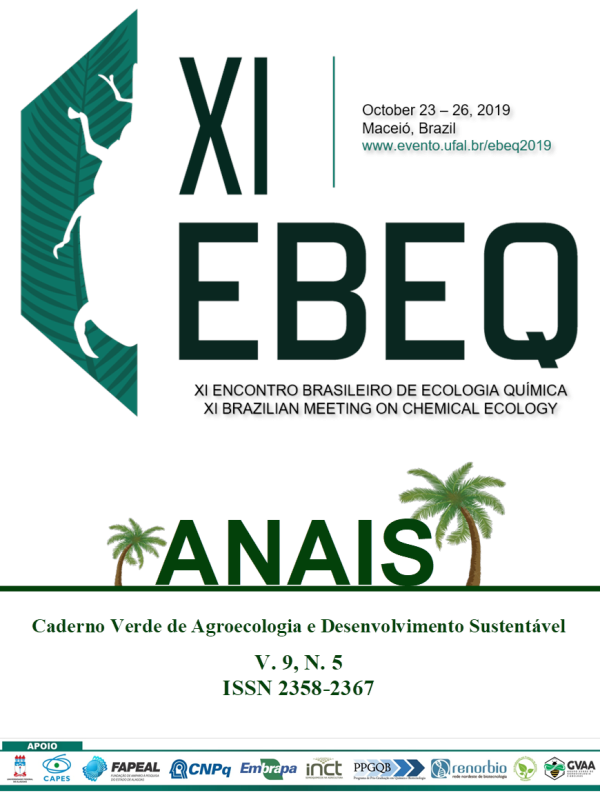THE ROLE OF CHEMICAL ECOLOGY IN POLLINATION AND ITS IMPLICATIONS ON AGRICULTURE
Keywords:
PLANT X INSECT INTERACTION, SEMIOCHEMICALS, VOLATILE ORGANIC COMPOUNDS, ECOSYSTEM SERVICES.Abstract
The role of pollinators in agriculture has been most evident in recent decades due to the recognition of the need for their presence for the productive success of some economically important crops. The demand for the use of pollinators for higher yields is well evidenced. Studies show that for pollination-dependent crops, in the absence of pollinators, six-fold larger acreage would be required to achieve the same yield rates. In South America alone, the value of pollination services is estimated at 11.6 billion euros a year, while in Brazil, only eight pollinator-dependent crops account for 9.3 billion dollars in exports. Thus, studies on plan x pollinator interaction are essential to identify ways to attract and maintain pollinators in plantations. However, chemical ecology studies involving pollinators are still scarce. In this sense, studies involving the elucidation of pheromones of insects responsible for pollination as well as of synomones (chemical constituents of floral odors responsible for attracting pollinators) are fundamental. These studies may enable strategies to attract and maintain pollinating agents in plantations, such as the use of baits containing both pheromones and synomones, as well as the use of companion plants that have common pollinators. As an example, we will present results obtained with attractive pollinators of the Annona squamosa.Downloads
Published
How to Cite
Issue
Section
License
Termo de cessão de direitos autorias
Esta é uma revista de acesso livre, em que, utiliza o termo de cessão seguindo a lei nº 9.610/1998, que altera, atualiza e consolida a legislação sobre direitos autorais no Brasil.
O(s) autor(es) doravante designado(s) CEDENTE, por meio desta, publica a OBRA no Caderno Verde de Agroecologia e Desenvolvimento Sustentável, representada pelo Grupo Verde de Agroecologia e Abelhas (GVAA), estabelecida na Rua Vicente Alves da Silva, 101, Bairro Petrópolis, Cidade de Pombal, Paraíba, Brasil. Caixa Postal 54 CEP 58840-000 doravante designada CESSIONÁRIA, nas condições descritas a seguir:
O CEDENTE declara que é (são) autor(es) e titular(es) da propriedade dos direitos autorais da OBRA submetida.
O CEDENTE declara que a OBRA não infringe direitos autorais e/ou outros direitos de propriedade de terceiros, que a divulgação de imagens (caso as mesmas existam) foi autorizada e que assume integral responsabilidade moral e/ou patrimonial, pelo seu conteúdo, perante terceiros.
O CEDENTE mantêm os direitos autorais e concedem à revista o direito de divulgação da OBRA, com o trabalho simultaneamente licenciado sob a Licença Creative Commons do tipo atribuição CC-BY.
O CEDENTE têm autorização para distribuição não-exclusiva da versão do trabalho publicada nesta revista.
O CEDENTE têm permissão e são estimulados a publicar e distribuir seu trabalho online (ex.: em repositórios institucionais ou na sua página pessoal) a qualquer ponto antes ou durante o processo editorial, já que isso pode gerar alterações produtivas, bem como aumentar o impacto e a citação do trabalho publicado.








